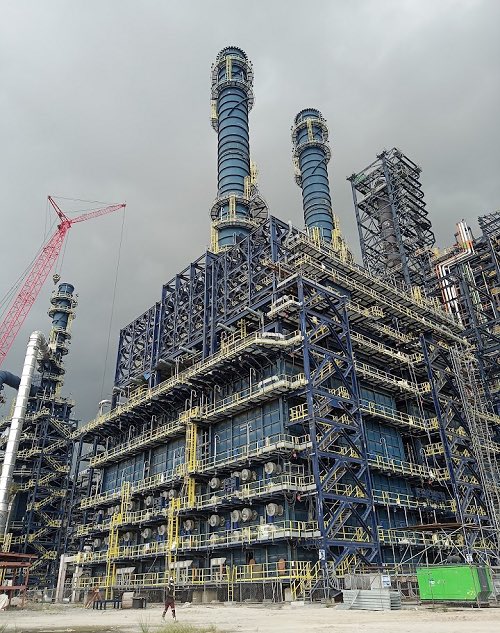
Shockwaves as Dangote Refinery Halts Petrol Sales in Naira from September 28

The Nigerian economy is set to experience yet another jolt as Africa’s largest refinery, the Dangote Refinery, has officially announced that it will suspend the sale of petrol in Naira beginning tomorrow, September 28, 2025. In a development that has left many industry stakeholders, consumers, and policymakers scrambling for answers, the refinery issued a message to its customers late on Saturday, stating clearly that it has exhausted its crude oil allocations that were priced in the local currency and will no longer be able to sustain petrol sales in Naira. This move marks a pivotal shift not only in Nigeria’s downstream oil sector but also in the larger conversation around the viability of the Naira, the country’s fragile economic stability, and the affordability of fuel for millions of Nigerians who are already grappling with inflation and high living costs.
According to the memo released by the Group Commercial Operations of the refinery, the decision was unavoidable. The statement read, “We cannot sustain PMS sales in Naira going forward,” a line that has since sparked widespread debate across financial circles, fuel marketers’ associations, and social media platforms. The refinery further requested that customers involved in ongoing Naira-based transactions should formally request refunds, while assuring them that updates will be provided when and if Naira sales are able to resume in the future. For now, however, it appears Nigerians will have to brace themselves for a new era where petrol from Dangote Refinery, long touted as the solution to Nigeria’s import dependency and foreign exchange crises, will only be priced in foreign currency.
This development comes just months after Dangote Refinery finally began full-scale production, following years of anticipation, delays, and massive investment totaling over $19 billion. The refinery had been hailed as a game-changer, expected to drastically reduce Nigeria’s reliance on imported petroleum products and ease pressure on the country’s foreign reserves. But the suspension of Naira-based sales now raises difficult questions about whether the local currency has failed to live up to expectations in sustaining the operations of a project of this magnitude. It also raises fears that petrol prices in Nigeria may spiral further out of control, as transactions denominated in dollars or other foreign currencies will expose consumers to exchange rate volatility and further weaken the purchasing power of ordinary citizens.
Already, Nigerians are no strangers to fuel price hikes. The deregulation of the downstream sector in 2023 and the removal of subsidies saw pump prices jump from less than ₦200 per liter to over ₦600, and in some cases ₦700, depending on location. The announcement by Dangote Refinery could push those figures even higher, especially if marketers are forced to purchase petrol in dollars while sourcing foreign exchange at the prevailing market rate. For a country where the minimum wage still stands at ₦30,000 per month for many workers, and inflation has consistently eroded incomes, the implications are dire. Transport costs, food prices, and the overall cost of living could skyrocket, further fueling public discontent and political tensions.
Industry experts have weighed in with mixed reactions. Some argue that the decision by Dangote Refinery is an indictment of the government’s inability to stabilize the Naira and provide a sustainable economic framework for large-scale industrial operations. They note that since the refinery procures crude oil in international markets and incurs costs that are largely dollar-denominated, it would be unrealistic to expect it to continue selling petrol in a currency that is rapidly losing value and difficult to convert. Others, however, believe that this move undermines the very reason the refinery was celebrated in the first place—to provide Nigerians with affordable, locally refined fuel while reducing reliance on imports. For them, the suspension of Naira sales feels like a betrayal of that promise and signals a deepening crisis in Nigeria’s foreign exchange management.
The Nigerian government has yet to issue an official response to the announcement, but analysts predict that pressure will mount on the administration to intervene. Whether through policy adjustments, foreign exchange support, or direct negotiations with Dangote Refinery, authorities will be forced to find a way to cushion the impact of this decision on the already overburdened population. Fuel unions and transport associations are also expected to react strongly, given that their costs will likely rise sharply once petrol sales in Naira cease. It is not unlikely that protests, strikes, or demonstrations could follow if the ripple effects become unbearable for the average Nigerian.
Beyond the domestic implications, this decision could also have regional and continental significance. Dangote Refinery was not only expected to serve Nigeria but also supply refined products to other West African nations, positioning itself as a hub in Africa’s energy landscape. With sales now restricted to foreign currency transactions, cross-border trade may be easier in some respects, but it further alienates Nigerian consumers who are paid in Naira and have little access to dollars. This creates a paradox where Nigeria, Africa’s largest crude oil producer and the proud home of the world’s biggest single-train refinery, may have its citizens priced out of its own resources.
For the refinery, the decision seems to be driven by pure economics rather than sentiment. Operating a facility of such size and scale requires steady financial flows, and the Naira’s volatility has made it unsustainable. The foreign exchange market has been plagued by scarcity, speculative trading, and constant depreciation, with the Naira trading at record lows against the dollar throughout 2025. In such a climate, businesses like Dangote Refinery cannot risk tying their revenues to a currency that is losing credibility both at home and abroad. The decision, while harsh on Nigerians, is perhaps the only logical step for the company to protect its bottom line and ensure uninterrupted operations.
However, the optics of this move are undeniably damaging. To many Nigerians, it reinforces the perception that their currency is worthless, that even domestic companies prefer to trade in dollars, and that the promise of economic relief through the refinery was little more than a mirage. Social media is already ablaze with angry reactions, with hashtags like #DangoteRefinery and #PetrolInDollars trending, as citizens express fear, frustration, and in some cases, despair. For a nation where petrol is more than just a commodity but a lifeline that affects every aspect of daily living, the psychological impact of this announcement cannot be overstated.
As September 28 dawns, Nigerians will wake up to a new reality, one that could shape the country’s economic trajectory for years to come. The suspension of Naira sales by Dangote Refinery is more than a business decision; it is a mirror reflecting the fragility of Nigeria’s financial system and the struggles of its people. While the refinery has promised to provide additional information and possibly resume Naira sales in the future, the damage may already be done. Trust in the Naira has been further eroded, trust in the refinery’s promise of relief has been shaken, and trust in the government’s ability to manage the economy is once again under question.
For now, all eyes will be on the government, the refinery, and the Nigerian people as they navigate yet another crisis in the nation’s long and complicated history with petrol. The suspension of Naira sales at Dangote Refinery may seem like a technical adjustment in the world of commerce, but on the ground, it is nothing short of a thunderbolt that could redefine the country’s economic and social landscape.

